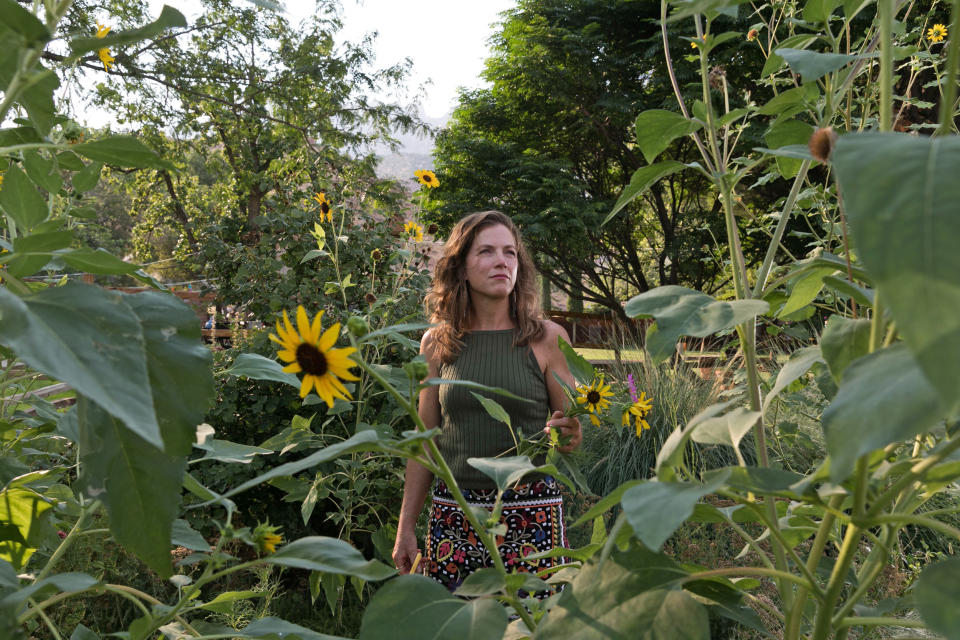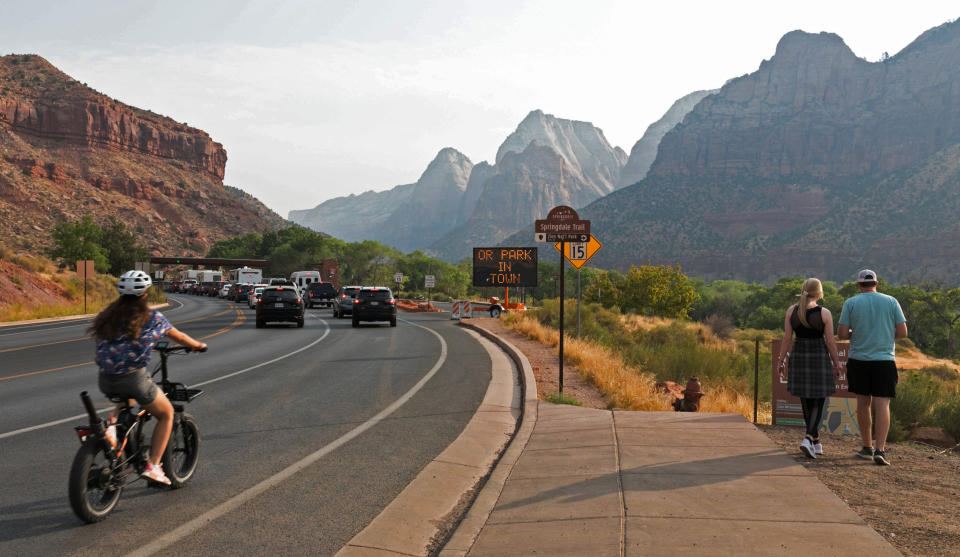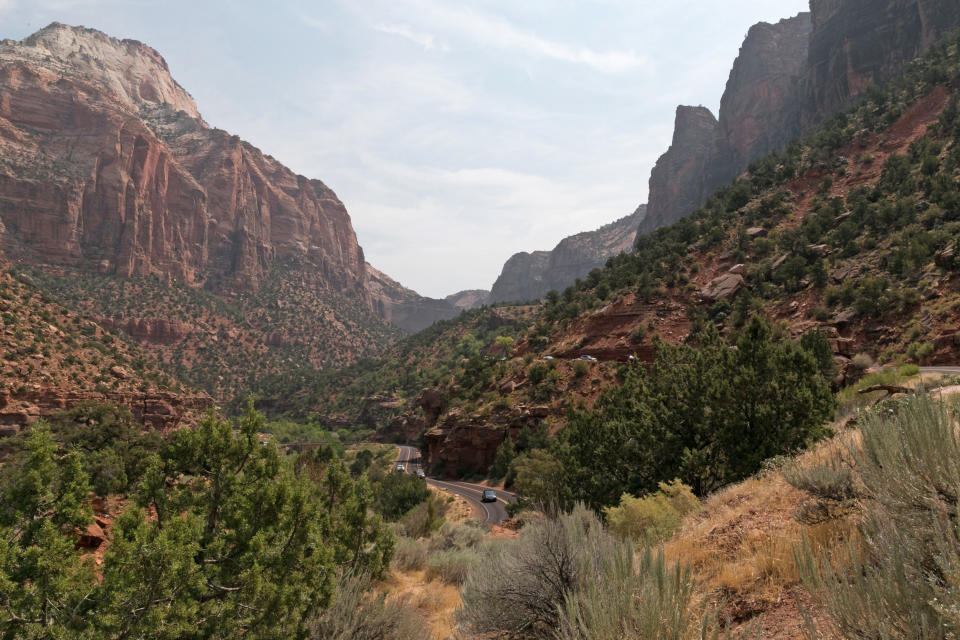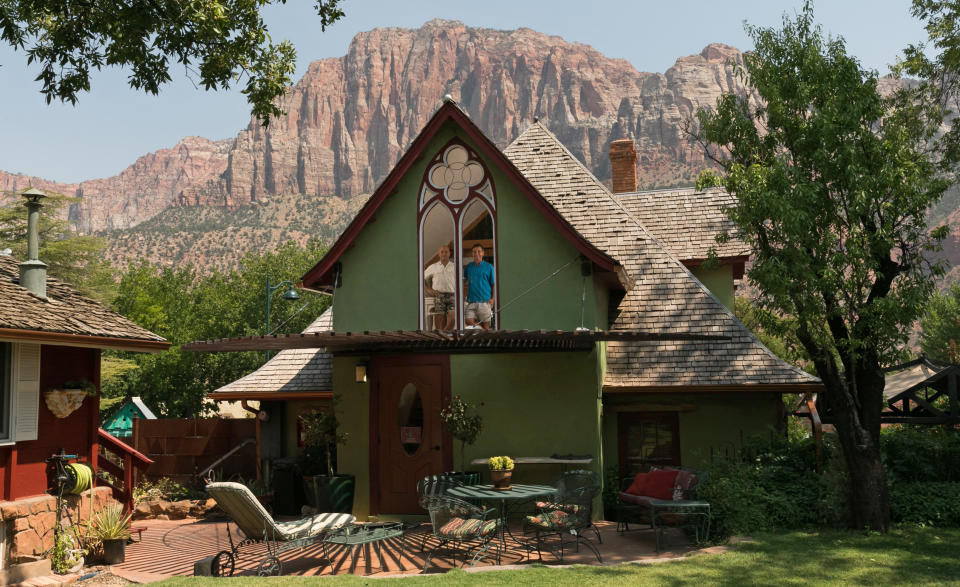A somber summer: A small town outside Zion National Park copes with COVID-19 changes
SPRINGDALE, Utah — Trish Jennings watched customers dining 6 feet apart outside her Bit & Spur Restaurant and Saloon on an evening in mid-August, missing the usual gregarious chatter of outdoor adventures.
This small southwest Utah town sits just outside the gates of Zion National Park, and most of the restaurant's customers arrived after a day exploring the park's 2,000-foot-deep canyon. Jennings, 53, and her staff are accustomed to swapping hiking and camping stories with thousands of visitors every summer from all over the world, often forging new friendships.
For many residents like Jennings, those daily exchanges were essential to the town's spirit, often making it seem bigger than a community of 660 people.
But the COVID-19 pandemic — along with Springdale's new social distancing measures and mask requirement — have given the easygoing, sociable town a subdued feeling this summer.
While tourists have steadily returned since the park reopened on May 13, there are still fewer than usual — 449,518 recreational visitors in July, down from 629,802 the same time last year, with few, if any, coming from outside the country — and the conversations in restaurants, shops and motels are shorter and more transactional. Many of the town's elderly residents are staying home, avoiding the crowds at the park.
"We still try to talk to people as much as we can, but it's those connections, those heart connections, that you miss," said Jennings, who has co-owned the Bit & Spur for 26 years. "That's not happening like it used to."

As in many towns at the entrances to national parks, residents of Springdale have faced a dilemma during the pandemic: They need tourists to return with an influx of cash for local businesses, but they fear the virus those visitors could bring into their community.
"It's like we're in the ultimate Catch-22, because we want them to return, but we also need people to play it safe," said Julie Gregoric, who has owned Springdale's Sol Foods Supermarket and Hoodoos General Store and Ice Cream Parlor for 20 years.
Full coverage of the coronavirus outbreak
Gregoric, 59, who described Sol Foods as catering to both the Cheez Whiz and Gouda crowds, misses joking with children about how many miles their parents made them hike or learning languages from the international visitors — she can tell people how to get to the liquor store in French, Italian and Spanish.
"It's hard to say when we'll be able to talk with people like that again," she said.

Springdale started as a farming community settled by Mormon pioneers in the late 1800s, but now the economy is almost entirely reliant on the more than 4 million tourists who visit Zion National Park every year. The hikers, backpackers and campers who stroll through the town from March to October are as much a part of Springdale's backdrop as the towering red and white sandstone canyon walls that encompass it.
Springdale officials and residents knew the park's closure in early April would be financially devastating for many in town, but they still pleaded for it, to reduce the risk to residents. They worried that the virus could overwhelm the town's single private clinic, which had the capacity to splint sprains and stitch cuts but not treat people infected with a deadly virus.
"The park was just getting really packed with people," Town Council member Suzanne Elger said. "So from a health and safety standpoint, it seemed like the best thing to do to protect the people who live here, work here and visit here."
Town officials say that since March, there have been about a dozen coronavirus cases in Springdale and no deaths.
After the park reopened in May following its six-week shutdown, Springdale officials enacted a mask mandate in July, requiring people to wear masks in retail and commercial establishments, while waiting to be seated and served at restaurants and at community gatherings. Utah is one of 16 states that do not have statewide mask mandates, and Springdale officials had to ask Gov. Gary Herbert, a Republican, for permission to enact the measure. Herbert agreed; he also allowed mask requirements in three other places in the state, including Grand County, home to Moab, just outside Arches and Canyonlands national parks.
Elger noted that after Zion reopened, several Springdale businesses had to close temporarily because of potential coronavirus cases, but she said she has not heard of any more cases or business closures since the town enacted the mask mandate.

Most residents welcomed the new rules. Business owners who have already faced financial setbacks from the park's closure now face the urgency of earning the money they will need to stay afloat during the quieter winter, so several said they support safety regulations that will allow them to stay open.
Gregoric began requiring masks inside her supermarket weeks before the town did so. Unlike other businesses that shut down after the park's closure, Gregoric kept her market open, because it's one of only two grocery stores in town.
While she said most tourists abide by the rules, some refuse to wear masks, leading to tense discussions, including one that turned into a shouting match in August.
"It's not something that happens around here very often," Gregoric said. "It doesn't feel good to have those conversations all the time, but it's what we need to do to keep everyone safe."
Residents say they have noticed that most of the tourists who have come to Springdale this summer have driven from Nevada and Southern California. Some are first-time national park visitors, stir-crazy in their homes, hoping an outdoor trip would be safe.
"I really didn't feel like there was much else to do right now," said Leah Cheshier, 26, who traveled from Houston to spend a week in the park with her fiancé, Nick Mustachio, 35.
It was the first vacation the couple had taken since the pandemic began in March. The pair, who both work for NASA, say they were not comfortable going to places where coronavirus cases were still surging, like Florida, nor did they want to go somewhere with many business closures. Cheshier said she noticed that visitors did not really interact with one another while in town, nor did anyone linger in the cafes or shops.
"Most people just keep to themselves, and we did, too," she said.

Even with the partial return of tourism, some Springdale business owners remain uncertain about the future.
Across the street from Gregoric's market is Under the Eaves Inn, a seven-room bed-and-breakfast in a green cottage with red trim. Mark Chambers, 59, and his husband, Joe Pitti, have owned and lived in it for about 11 years. Like many other local businesses, theirs was able to stay afloat this spring only when it received loans from federal coronavirus relief programs.
"We just kept getting calls for cancellations, and we were returning deposits that we had counted on to make it through the previous winter," Chambers said. He said that usually by this time in the year, they are turning away customers because the inn is booked solid through September and October. But now, the couple say, reservations come in only about a week in advance. They have few walk-in guests, and many of their regular customers have canceled annual trips.
"It's like we just have to wait and see what happens instead," Pitti, 59, said.
Download the NBC News app for full coverage and alerts about the coronavirus outbreak
To make the inn safer, Chambers and Pitti shut down the main room, where they had invited guests to get coffee and watch goldfinches play in the birdbath in the front yard. The pair no longer greet guests as they come in, giving them a rundown of the town and getting to know them, which had been the couple's favorite part of being inn owners.
They also miss conversations at the post office, where neighbors often ran into one another and stopped to discuss town happenings. Now, people just grab their mail and leave.
"There is an absence of an energy that flows through the town in a much more kinetic way, because everyone is kind of in their own bubble," Pitti said.
For now, he and Chambers are grateful to be in business this season.
Pitti pointed to the sun shining down on the canyon peaks on a late August afternoon.
"That right there, though," he said. "That's what keeps us going."


